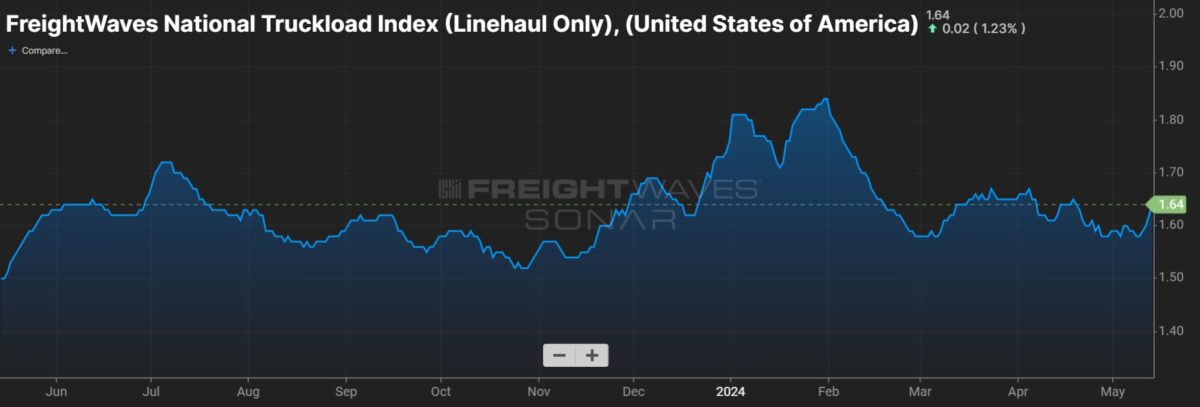The shipments component of the Cass Freight Index fell again in the month, down 1.6% seasonally adjusted from March and 4% lower year over year (y/y). The Tuesday data showed volumes were hovering around the late 2023-January 2024 cycle trough. The April reading was the lowest since January, which is typically the slowest part of the year and weaker than normal this year due to severe winter storms.
A later Lunar New Year and the Baltimore bridge collapse were cited as detractors to demand during the month. The report also said additions to private fleets are negatively impacting results at the for-hire fleets.
"Private fleets are now more actively competing for spot freight to fill empty backhauls, lengthening below-trend for-hire demand levels" the report said.
The y/y comparisons for the shipments index get easier in the coming months. The forecast is for the data set to decline 3% y/y in May. A prior forecast called for the index to turn positive by June, but that appears in jeopardy now.
| April 2024 | y/y |
2-year |
m/m |
m/m (SA) |
| Shipments | -4.0% | -6.3% | -1.3% | -1.6% |
| Expenditures | -16.8% | -28.4% | 0.0% | -1.9% |
| TL Linehaul Index | -3.8% | -15.6% | 0.1% | NM |
Table: Cass Information Systems (SA – seasonally adjusted)
Cass' expenditures index, which measures all dollars spent on freight including fuel surcharges and accessorial charges, fell 16.8% y/y in April and 1.9% from March on a seasonally adjusted basis. Backing out the decline in shipments implies rates were off 13% y/y in the month, which was the smallest decline in implied rates since last May.
The y/y comps also get easier this summer. The index is expected to decline 16% y/y in the first half of 2024 and 10% for the full year.
The Truckload Linehaul Index, which excludes changes in fuel and accessorial charges, declined 3.8% y/y but ticked 0.1% higher than the March reading.
The TL rate index includes both spot and contract freight. It has largely been flat for the past year.
"With spot rates steady over the past several months, downward pressure on the larger contract market is lessening, with some instances of contract rate increases bucking the downtrend recently" the report said.
Schneider National SNDR was the lone carrier to report improvement in contractual rate negotiations during the first-quarter earnings season. It said contract renewals turned positive in the period for the first time in six quarters, with pricing up by a low-single-digit percentage. However, it was also quick to say that it's "not calling an inflection in the market" yet.
The linehaul index's two-year-stacked comp (to April 2022) was down more than 15%, which was the biggest decline ever recorded in the data set.
"Goldilocks economic conditions of strong growth and disinflation are largely holding, a rising tide which eventually should lift all boats" the report said. "But at the moment, the freight growth being generated by the economy is being handled by railroads and private fleets."
Data used in the indexes is derived from freight bills paid by Cass Information Systems CASS, a provider of payment management solutions. Cass processes roughly $40 billion in freight payables annually on behalf of customers.

Chart: (SONAR - NTIL.USA). The National Truckload Index (linehaul only – NTIL) is based on an average of booked spot dry van loads from 250,000 lanes. The NTIL is a seven-day moving average of linehaul spot rates excluding fuel.
The post April Cass data shows no improvement in freight demand appeared first on FreightWaves.
Edge Rankings
Price Trend
© 2025 Benzinga.com. Benzinga does not provide investment advice. All rights reserved.
Trade confidently with insights and alerts from analyst ratings, free reports and breaking news that affects the stocks you care about.